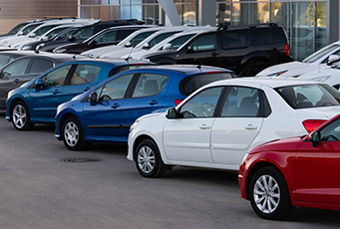If you enjoy having a new vehicle, drive 15,000 or fewer miles per year, and want a nice car with a lower payment, then you could be a good candidate for leasing. While leasing has benefits, it's important to understand the disadvantages before making your decision.
Benefits of Leasing
- Lower monthly payment than if you were to finance when purchasing the vehicle.
- Ability to afford a nicer vehicle.
- Minimal to no down payment is required.
- Less sales tax because you only pay tax for the time you drive the vehicle, i.e., the lease term.
- Ability to drive a new car every few years.
- Most repairs and routine maintenance are covered under warranty or the lease contract.
- There is no further obligation when the lease contract expires.
Disadvantages of Leasing
- Ongoing car payment. Leasing a car is comparable to renting instead of purchasing a home.
- Mileage limitations may cause you to pay more than expected.
- Requirement to pay for damage that is more than normal "wear and tear" when turning in the vehicle.
- The lease is a contract, and you are obligated for the lease term. You cannot decide to "return" the vehicle to the dealer if you encounter financial hardship or change your mind. If you die, your estate is liable for completing the lease contract.
Before You Sign
Assess your driving habits. If you drive more than 12,000 miles per year, you may exceed the allowable mileage limit. You can, however, buy additional miles when negotiating the lease terms, which will be less costly than paying for any overage when you return the vehicle. For example, the average cost for buying mileage when you initiate your lease is $0.05 per mile versus $0.25 or more if you pay for it at the end of the lease.
Negotiate the price of the vehicle. Whether you plan to lease or buy, it's important to do your research to determine a fair price.
Pay attention to the residual value. The residual value is the dollar amount agreed upon to represent the vehicle's value at the end of the lease period. You want a high residual value. The smaller the difference between the selling price and the residual value, the lower your monthly lease payments will be.
Check your credit score. Your credit will be checked if you lease or buy a vehicle. Of course, the higher your score, the better. And if you have a freeze on your credit, be sure to lift it before you shop.
Determine the appropriate lease term. Because you pay for maintenance on the leased vehicle, it is smart to keep your lease term within the warranty period. Most warranties last three years.
Cash for a down payment. You can make a down payment when leasing a vehicle. However, the required amount could be fairly low, or even $0. The lease payment will be determined by the amount you pay up-front; the higher the down payment, the lower the monthly expense. Remember, however, that your down payment could be "lost" if the vehicle is totaled in an accident shortly after signing the deal.
Other Considerations
If you lease, you still need to purchase auto insurance. In addition, you will also want gap insurance. Gap insurance pays any shortfall between what your insurance company pays the dealership for replacement and the balance of your total lease obligation if your vehicle is totaled or stolen. If gap insurance is not included with your lease, you must purchase it with your auto policy.
If you're considering purchasing the vehicle at the end of the lease, first compare the buyback price to the current resale value. The buyback price is the amount of the residual value determined at the lease's onset. Note: if you negotiated a higher residual value to reduce the monthly lease payments when engaging in the lease, you have likely compounded your cost, which can make the buyback less attractive.
Summary
Leasing has its benefits. However, recognize the trade-offs versus buying. Wanting a new vehicle every few years is generally the reason people lease. If this is your preference, read and understand the contract before you sign it.
Schedule a Consultation
We have helped our clients answer these questions and more. If you want a clear understanding of your financial future, and need help making changes to reach your goals, schedule a consultation and we can get started.
Recommended Articles
Used Car Prices Finally Starting to Cool Off
If you are in the market for a used vehicle, you should...





